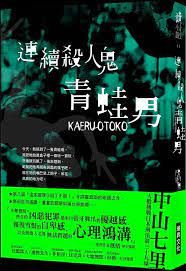Unkillable Malice---"The Serial Murderer Frog Man" from Qili, Zhongshan

The protagonist of this story is Furatekawa, a passionate criminal who is also active in the forensic mystery series "Hippocratic Oath" and "Hippocratic Melancholy". According to the timeline, it should be before Furukawa met Makoto in the forensic science classroom. In this novel, you can read about Furatekawa in the early stages of his career as a detective, and it also looks back on his experiences in childhood and adolescence. You can better understand why Furate River became the later Furate River.
The style of this series of novels is completely different from the musical mystery dramas of Zhongshan Qili: "Goodbye Debry", "Forever Chopin", "Encounter with Beethoven", etc., but the themes are vaguely similar, and one of them will definitely appear. The melody is "Bullying". In the story of "Frog Man", bullying does not only occur on campus, but is further viewed in larger groups such as communities and cities. The author seems to be saying that what is scary is not the existence of [bullies], but the malice of potential bullies that exists in everyone's heart. This malice may be labeled [sense of justice], or other more noble reasons.
The atmosphere of the story reminded me of the film adaptations of Hitchcock novels I watched as a child. Weird, terrifying, and simultaneously stimulating to the senses and the mind. But these are not just to satisfy the desire to pursue horrific excitement. In fact, they also imply criticism and reflection on human nature, the psychology of the masses, and the social system.
Junichiro was bullied in junior high school. The last person he attacked angrily before committing suicide was not his bully, but his friend Furukawa who not only did not lend a helping hand, but also told him to "be patient".
" Sometimes bystanders are even more despicable than the perpetrators. They are stinky cowards who are unwilling to face up to their own malice and cowardice, and who are unable to truly become a bad person."
"That day, it was no longer important who the murder weapon was intended to be used against. What was important was that Junichiro vented his last emotions on himself. It was this fact that made Furukawa endlessly sad."
In order to escape the hypocritical and cowardly self, "After racking his brains, Furukawa came up with the method of [revenge]. He decided to call the students who bullied Junichiro one by one to the corner of the school building to settle accounts." This one is based on justice. The motivation for fame also became the reason why he later became a police officer.
The sound of Sayuri's piano was a comfort to Furukawa. In the music played by Sayuri, he felt an acceptance that he had never felt from his native family. But Sayuri is also a mentally abnormal person. She developed a perverted personality due to sexual abuse by her father when she was young. She started killing small animals and cut off the heads of her friends out of jealousy when she was twelve years old. Convicted of mental disorder, she was not sent to prison, but was sent to a correctional institution, where she met psychiatrist Omaezaki. Omaezaki was like her second father, rebirthing her in spirit. As a result, Sayuri had a reborn personality and seemed to be able to live a healthy and normal life in society from now on. But Omaezaki used Sayuri to avenge himself. Sayuri was once again brutally violated and betrayed......
I don’t know if Sayuri’s tragic experience can justify her evil act of killing her own child. Because she has been abused, does it make all her actions [innocent]?
I'm thinking that the perpetrators may be able to find a hundred rationalizations for themselves. Even the psychiatrist Omaezaki just wanted to avenge his only daughter. But when one person has no feeling for the harm caused by another person, this may be considered as some kind of mental abnormality.
The collective psychopathy of society is that we no longer feel anything about the suffering of a certain class of people and we find many reasons to rationalize it. Because they are bad, lazy, because they don't work hard enough. Or even just plain bad luck.
The connotation of [justice] may be different for everyone. One of the most thrilling scenes in the story is in the dark piano room, where Furukawa drags his scarred body against the murderer who doesn't know where he is. I think this scene is very metaphorical. Sometimes what we have to fight is not an upright enemy, but an unpredictable evil that is hidden somewhere. This malice does not come from the enemy you can concentrate on fighting, but from your most trusted friends, family, or even yourself. Sometimes we feel that we have no chance of winning, resisting and resisting such omnipresent malice.
Every time I read Zhongshan Qili's novels, I can read these explorations and questions about human nature between the lines, which are like dissecting corpses and goryly digging out many hypocrisies hidden under the surface of life. Zhongshan Qili does not easily provide answers to these difficult questions. He just allows you to be there and witness how the characters in the story face these struggles. Psychological mystery novels are a difficult category to write, but this one is a very successful one.
Like my work? Don't forget to support and clap, let me know that you are with me on the road of creation. Keep this enthusiasm together!
